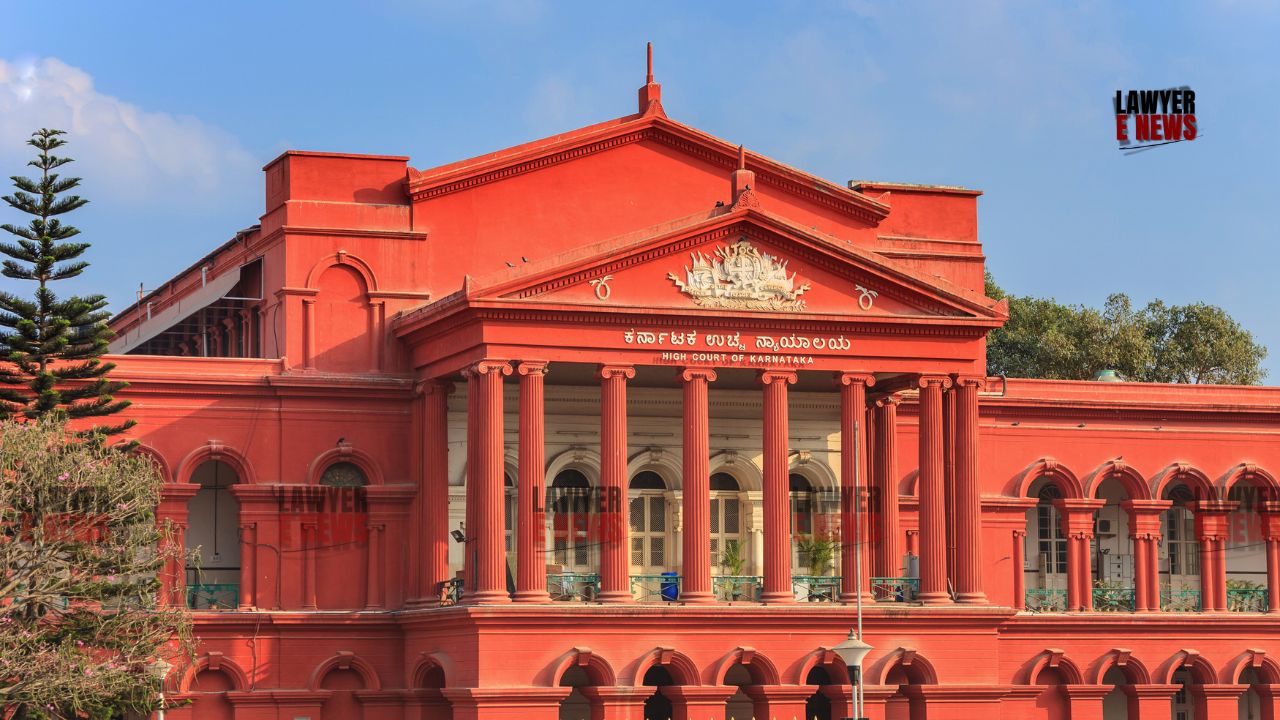-
by Admin
15 February 2026 5:35 AM



In a critical ruling delivered by a division bench of the Karnataka High Court comprising Hon'ble Justice K.S. Mudagal and Hon'ble Justice Vijaykumar A. Patil dismissed a writ petition challenging a trial court’s order directing the accused to deposit Rs. 20,650 as travel expenses for a prosecution witness. The court held that the provisions of Sections 243(3) and 312 of the Code of Criminal Procedure (Cr.P.C.) empower trial courts to exercise discretion in determining reasonable expenses for witnesses summoned by the accused, irrespective of the Karnataka Payment by Government of Expenses of Complainants and Witnesses Rules, 1967 (Rules, 1967). The petition was dismissed with costs of Rs. 10,000, terming the plea a misuse of judicial process aimed at delaying trial proceedings.
"Rules Apply to Government-Paid Witness Expenses, Not Expenses Borne by Accused"
The court categorically rejected the petitioner’s reliance on the Karnataka Witness Expense Rules, 1967, asserting that the rules govern payment by the government and not costs imposed on accused persons. The judgment clarified:
"Section 312 of Cr.P.C. is meant for payment of expenses by the Government, subject to any rules framed by the State. However, when it comes to expenses for witnesses summoned at the behest of the accused under Section 243(3), the provision grants discretion to the court to fix reasonable costs, independent of state rules."
The petitioner, Dr. Sabeel Ahmed, alias Motu Doctor, along with his co-accused, is facing trial in Special Case No. 378/2021 before the Special NIA Court in Bengaluru under charges of conspiracy to commit terrorist acts under the Unlawful Activities (Prevention) Act, 1967, and the Indian Penal Code. The prosecution alleged that Dr. Ahmed provided logistical and financial support to the banned terrorist organization Lashkar-e-Taiba (LeT) by raising funds and recruiting individuals at events held in Saudi Arabia.
During the trial, PW.13, a scientist from C-DAC (an autonomous body under the Societies Registration Act, 1860) in Thiruvananthapuram, Kerala, was summoned as a prosecution witness. The petitioner sought repeated adjournments to cross-examine the witness. On two prior occasions, the trial court granted adjournments but directed the accused to deposit the travel expenses of Rs. 20,650 as calculated by the Special Public Prosecutor. Instead of complying, the petitioner moved an application seeking reduction of the travel costs under Rule 4(3) of the Rules, 1967.
The Special NIA Court rejected the application, holding that the Karnataka Witness Expense Rules, 1967, do not apply to autonomous bodies like C-DAC. It further noted that the petitioner had failed to cross-examine the witness despite being granted adjournments. "The Rules of 1967 govern payments by the government and not expenses imposed on accused persons," the trial court concluded.
The High Court upheld the trial court’s reasoning and dismissed the petition. It emphasized that the Rules, 1967, were inapplicable as they specifically pertain to payments by the government. It noted:
"The title and preamble of the Karnataka Payment by Government of Expenses of Complainants and Witnesses Rules, 1967, make it clear that they govern expenses borne by the state, not costs payable by the accused. Therefore, reliance on Rule 4(3) is misplaced."
"Section 243(3) of Cr.P.C. provides that the court may require the accused to deposit reasonable expenses for summoning witnesses. This discretion is not subject to state rules and is designed to ensure fairness in proceedings while avoiding abuse by accused persons seeking to delay trials."
The court took serious note of the petitioner’s repeated adjournments since January 2024, which had caused significant delays in the trial. "The petitioner’s actions constitute nothing but abuse of the judicial process. Summoning a witness repeatedly, especially a scientist from a public institution, not only disrupts their professional duties but also wastes valuable public resources," the bench remarked.
It also highlighted that co-accused No. 24, who was a co-applicant in the application for reducing travel expenses, did not challenge the trial court’s order. "Split verdicts on identical issues are impermissible. This petition, therefore, lacks merit on that ground as well," the court noted.
The court emphasized the need to deter misuse of judicial process by imposing costs. It ruled:
"The petitioner’s conduct in repeatedly seeking adjournments and filing meritless applications is a clear attempt to procrastinate proceedings. Such actions undermine the integrity of the judicial system and warrant exemplary costs."
Dismissing the petition, the court directed the petitioner to deposit the travel expenses of Rs. 20,650 within 10 days. It warned that failure to comply would forfeit the petitioner’s right to cross-examine PW.13. Additionally, the court imposed costs of Rs. 10,000, payable to the District Legal Services Authority, Bengaluru Urban District, within the same timeframe. Non-payment would result in recovery as arrears of land revenue.
"The petitioner’s plea is a textbook example of abuse of process. The trial court’s order is not only legally sound but also necessary to ensure the expeditious progress of trial proceedings. Litigants must recognize that justice cannot be obstructed through frivolous objections and delay tactics."
Date of Decision: November 15, 2024
